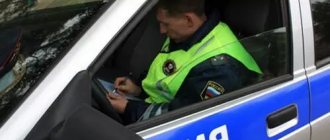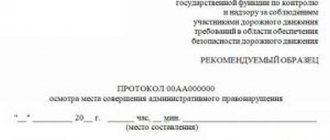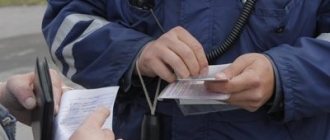Many car owners complain about abuse or inaction on the part of police officers (in particular, traffic police officers). However, this is often due to the legal illiteracy of motorists themselves. In this regard, this publication will tell you: how to behave correctly if a traffic police officer stops your car; what actions or inactions may qualify as unlawful actions of traffic police officers. A general procedure is also presented that allows you to appeal against such violations by persons who are on duty.
Unlawful actions of traffic police officers
Unlawful actions are actions or inactions on the part of police officers or other officials serving in the traffic police, which directly or indirectly violate the standards of the current Russian legislation, or the official charter adopted by the traffic police department.
If the car owner intends to file a complaint in the future against the actions/inactions of a traffic police officer, then he must clearly understand what rights he has and what he is obliged to do when stopping a vehicle at the request of an authorized officer. The car owner's procedure is as follows.
- A complete stop of the vehicle by turning off the engine and removing the keys from the ignition.
- It is necessary to open the car window so that you can freely show the employee your driver’s license.
- It is advisable to get out of the car only at the request or demand of a traffic police officer. This can happen in the following cases: suspicion against the driver or passenger of committing an act that may be classified as a crime; suspicion that the driver is under the influence of alcohol or drugs; presence of a vehicle malfunction; the need to check the cargo; providing assistance to other road users. The latter, as a rule, is expressed exclusively as a request and calls for civil liability, but not as an instruction for mandatory execution.
How to avoid punishment for refusing a medical examination.
Find out how to appeal a parking fine here.
Where to go if you disagree with traffic police fines, read the link:
A traffic police officer has the authority to stop a vehicle only in the following cases (other reasons for stopping can be considered illegal).
- For routine verification of document compliance at specialized traffic police points (checkpoints, etc.).
- Committing offenses specified in the Traffic Regulations and the Code of Administrative Offences.
- Availability of information that the driver or his passengers may be involved in an act that is classified as a crime or offense.
- The presence of official information that this vehicle is contained in the database of wanted vehicles or there is a suspicion that this vehicle is involved in a particular illegal act.
- Availability of information that the driver or passenger is a witness to the unlawful act committed.
- Instructions from government agencies or authorized officials to conduct an inspection of documents or cargo transported by vehicles.
- In order to attract drivers and/or passengers to participate in providing assistance to third parties or police officers.
Important! In the absence of these grounds, it makes sense to talk about such a phenomenon as abuse on the part of an official in charge, which serves as the basis for subsequently drawing up a corresponding statement.
How to challenge the actions of the traffic police
If your rights are violated by illegal actions of the traffic police , then you can challenge them in court . Let’s say an employee stops you and says that he saw you cross a solid line while overtaking another car. In this case, there is no photo or video recording, it’s all in words, and he issues a resolution on an administrative offense, which provides for deprivation of rights for up to six months (Article 12.15 of the Code of Administrative Offenses of the Russian Federation). In the protocol you write that you do not agree with the actions of the traffic police and do not admit guilt. To challenge this decision you will need to go to court.
Where to file a complaint about unlawful actions of traffic police officers
In deciding how to restore justice within the framework of the topic under consideration, they turn to two main authorities.
- UGIBDD. In this case, the application is drawn up in the name of the law enforcement officer who committed unlawful actions or inactions. He, in turn, is obliged to forward the complaint to higher authorities. Or a complaint about unlawful actions of traffic police officers is written to the head of the State Traffic Safety Inspectorate - this option is faster and more reliable. The complaint is sent by mail or submitted in person. When sending by mail, it is important to order the shipment with notification. When submitting in person, you must obtain a receipt from the addressee.
- Court. A complaint can be filed with the court immediately or if it is impossible to resolve the conflict pre-trial.
Appealing illegal actions of traffic police officers
Experienced legal lawyers will help you appeal the illegal actions of traffic police officers. Take advantage of a free consultation from our center’s specialists.
Anyone may have a situation of misunderstanding with a traffic police officer when the inspector clearly exceeds his legal authority and violates the driver’s rights in the hope that his actions will go unpunished. Among the most common violations that traffic police inspectors commit themselves are:
- Refusal to return documents to the driver for a long period of time;
- Illegal towing of a vehicle;
- Detention of a vehicle, even if the reasons for the detention have been eliminated;
- Checking a vehicle outside a stationary post;
- Illegal removal of registration plates from a car;
- Delivery of a sober driver to a medical facility to undergo an appropriate examination without any reason;
- Not providing details for paying fines and the like.
Each of the listed actions is illegal because it violates the driver’s rights, and therefore can be appealed in court. It should be remembered that not only do representatives of the traffic police not have any supernatural power, but they are also obliged to obey the law more than others. Therefore, in accordance with the Law of the Russian Federation dated April 27, 1993 No. 4866-1 “On appealing in court actions and decisions that violate the rights and freedoms of citizens,” as well as Chapter 25 of the Civil Procedure Code, you have every right to go to court to appeal any illegal actions by government officials.
There are many myths that it is difficult to appeal the decision of a traffic police officer. They are often made up of drivers who do not have the necessary knowledge and experience in such matters. For a professional lawyer, appealing the actions of traffic police officers is more than a realistic procedure. And the reason for the myths was basic illiteracy, because of which one often has to pay unfair fines or put up with the deprivation of a driver’s license.
Appeals against illegal actions of traffic police officers are made either to a higher authority of the traffic police or in court. When choosing the second option (district court), the complaint can be filed both at your place of residence and at the location of the traffic police authority.
Experienced legal lawyers will provide the following services to protect your rights and interests:
- Free initial consultation;
- Writing a complaint against decisions made by the traffic police;
- Appealing against unfounded conclusions that you are at fault for an accident;
- Drawing up a statement of claim and submitting it to the court;
- Protection of rights in court.
Also, do not forget that the traffic police system itself very harshly punishes its employees who were found violating the legal rights of car owners. The main thing is not to delay contacting an experienced lawyer, since a limited period of time is allotted for appealing the illegal actions of traffic police inspectors.
0 0 vote
Article rating
How to file a complaint about unlawful actions of traffic police officers
The type of complaint under consideration can be schematically presented as follows.
- At the top right, the addressee (position, full name, address) and the sender (address and full name) are indicated.
- After this, the title of the document is indicated in the middle of the sheet.
- All circumstances relevant to the case are described and the actions of a law enforcement officer are indicated in which the car owner sees violations of the current legislation or the official Charter.
- The next paragraph is “Appendices”, which lists material evidence (recordings from a camera or video camera), as well as requests to call witnesses.
- Date and signature are added.
Below, car owners can familiarize themselves with a sample complaint to be sent to the State Traffic Safety Inspectorate.
To the Head of the State Traffic Safety Inspectorate of the Department of Internal Affairs of the city (name of the locality) Address of the recipient of the complaint Position and full name. recipient of the complaint, From: Full name the complainant living at the address: address of the complainant Complaint
The circumstances of the case are stated and actions that are unauthorized are indicated with reference to laws and other regulations.
Based on the above, I request:
The demands of the complainant are listed (in particular, the invalidation of the resolution recognizing the car owner’s act as an offence).
Applications:
The documents and material evidence attached to the complaint are listed.
Signature and date
Deadlines for appeal
The current administrative legislation establishes a period for appealing a decision made by a court or a traffic police official. This period is specified in Part 1 of Art. 30.3. The Code of Administrative Offenses is 10 calendar days. It is calculated from the moment the violator or other person who has the right to appeal is given a copy of the decision.
According to Part 2 of Art. 30.3. Code of Administrative Offenses, the specified 10-day period can be restored. To do this, a citizen who intends to restore the period for appealing a traffic police decision must submit a petition addressed to the person authorized to consider the complaint (a traffic police officer or a court). If the application for reinstatement is not satisfied, a ruling is issued (Part 4 of Article 30.3 of the Administrative Code).
The decision to reject can also be appealed, as stated in paragraph. 2 clause 31 of the Resolution of the Plenum of the Russian Armed Forces No. 5 of March 24, 2005.
General recommendations for filing a complaint against unlawful actions of traffic police officers
When making a complaint, it is important to consider the following key principles:
- The complaint must indicate the articles of codes or other legislative acts on the basis of which the application is being submitted.
- The circumstances of the case must be presented as objectively as possible.
- It is necessary to provide the maximum amount of evidence, the burden of collecting which falls on the complainant.
Is it possible to appeal the revocation of a driver's license?
Read how to appeal a traffic police fine from a camera here.
Read about fines for illegal parking at the following link:
Where can I appeal a traffic police decision?
A citizen who intends to protest a previously issued decision of the traffic police can draw up and bring a complaint of his choice:
- or directly to the traffic police inspector or the judge who issued the verdict on the imposition of punishment (part 1 of article 30.2 of the Administrative Code);
- or immediately, bypassing the above-mentioned persons, to a higher court or to a higher-ranking traffic police officer (Part 3 of Article 30.2 of the Administrative Code).
Nuances:
- nothing bad will happen if you file a complaint “to the wrong person” - in accordance with Part 4 of Art. 30.2. Code of Administrative Offenses, a written protest will be forwarded to the jurisdiction within three days after its receipt;
- if a citizen intends to immediately submit a protest to superiors, bypassing those below him, then you need to know the following - if the decision was made by a court, then you can only appeal to a higher court (clause 1, part 1, article 30.1 of the Code of Administrative Offenses), but if official, then you can choose - either to file a complaint with the court, or to a higher-ranking traffic police officer (clause 3, part 1, article 30.1 of the Code);
- if the complaint is simultaneously submitted to the court and to a higher-ranking traffic police officer, then the case will be considered by the court (Part 2 of Article 30.1 of the Code).
Procedure for determining the culprit of an accident
By and large, traffic police officers, when drawing up an accident report, do not have the right to determine the culprit. They only certify the fact of a traffic accident that occurred as a result of a traffic violation, and then apply the appropriate punishment to the violator. But only the court can accurately determine the culprit of the accident, having examined the case from all possible sides and using the testimony of witnesses and other materials.
In general, the procedure for identifying the culprit of an accident, if none of the drivers takes responsibility for the accident, looks like this:
- Traffic police officers analyze all the circumstances of the incident and draw up a report, after which all participants in the accident are issued certificates of the accident. These certificates usually do not indicate who exactly is at fault for the accident;
- If during the investigation the traffic police inspectors come to the conclusion that no one is to blame for the accident, then the accident case is closed. No one is punished, and all participants in the accident only receive certificates of the accident, which are then transferred to the insurer;
- If any of the participants in the accident does not agree with the opinion of the road inspectors about the circumstances of the accident, then he has the right to file a lawsuit in order to identify the true culprit of the accident;
- The claim will need to be accompanied by all the necessary documents related to the accident - a protocol on an administrative offense, a certificate from the traffic police, the results of various examinations, witness statements, data from video cameras, etc.;
- The court, having familiarized itself with all the materials of the case, can either agree with the decision of the traffic police officers on the degree of guilt of a particular road user (then the case will be closed), or disagree. In the latter case, a re-investigation of the circumstances of the accident will be ordered, technical examinations will be ordered, and witnesses will be interviewed;
- After carrying out all the necessary procedures, the court will make its decision on the guilt of one or another participant in the accident. This decision may confirm the position of the traffic police, or it may refute it;
- With a court decision, you can already contact the insurer to receive insurance compensation for the damage received under the compulsory motor liability insurance policy. If both drivers are to blame for the accident, then they have the right to expect only partial compensation, depending on their own fault in the incident.










